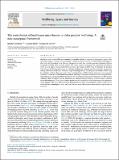Files in this item
The contribution of healthcare smart homes to older peoples' wellbeing : a new conceptual framework
Item metadata
| dc.contributor.author | Creaney, Rachel | |
| dc.contributor.author | Reid, Louise | |
| dc.contributor.author | Currie, Margaret | |
| dc.date.accessioned | 2021-04-06T14:30:16Z | |
| dc.date.available | 2021-04-06T14:30:16Z | |
| dc.date.issued | 2021 | |
| dc.identifier | 273541907 | |
| dc.identifier | f0a1645e-110e-4942-bab0-9ac0c5a6b38f | |
| dc.identifier | 85119978916 | |
| dc.identifier.citation | Creaney , R , Reid , L & Currie , M 2021 , ' The contribution of healthcare smart homes to older peoples' wellbeing : a new conceptual framework ' , Wellbeing, Space and Society , vol. 2 , 100031 . https://doi.org/10.1016/j.wss.2021.100031 | en |
| dc.identifier.issn | 2666-5581 | |
| dc.identifier.other | RIS: urn:E145914454883FBC09EAC146B4D1A263 | |
| dc.identifier.other | ORCID: /0000-0003-0577-1210/work/91685613 | |
| dc.identifier.uri | https://hdl.handle.net/10023/21775 | |
| dc.description | This work was undertaken during a PhD studentship with the Economic and Social Research Council (ESRC). | en |
| dc.description.abstract | Healthcare smart homes (HSH) are promoted as a possible solution in response to demographic ageing. They encourage ageing-in-place by enabling residents to remain in their own homes by utilising smart technologies to allow safe and independent living. However, the degree to which they currently encourage relational wellbeing of residents and their wider networks is novel. This critical narrative review provides a theoretical contribution to the growing body of social science literature around the impacts of HSH living. It highlights the potential links between HSH living and impacts on relational wellbeing of residents and wider networks. Arguing that existing HSH literature has often focused on single technology devices and the perceived benefits of HSH living by technology and home developers, rather than lived experiences of HSH residents, it presents a new conceptual framework, around which HSH should be promoted, focussing on individual residents and their caring networks, rather than technological possibilities. Specifically, the new framework highlights the importance of HSH resident wellbeing which we suggest may be maintained and enhanced through ensuring a sense of home, relational rather than independent living, accounting for potential spatial inequalities and the importance of appropriate use of language. This paper aims to generate discussion around better understandings of what it means to live with healthcare technologies at home, and how these may act to (dis)empower those wishing to age-in-place or otherwise. | |
| dc.format.extent | 8 | |
| dc.format.extent | 577860 | |
| dc.language.iso | eng | |
| dc.relation.ispartof | Wellbeing, Space and Society | en |
| dc.subject | Ageing-in-place | en |
| dc.subject | Healthcare smart homes | en |
| dc.subject | Older people | en |
| dc.subject | Caring networks | en |
| dc.subject | Wellbeing | en |
| dc.subject | H Social Sciences (General) | en |
| dc.subject | T-NDAS | en |
| dc.subject.lcc | H1 | en |
| dc.title | The contribution of healthcare smart homes to older peoples' wellbeing : a new conceptual framework | en |
| dc.type | Journal article | en |
| dc.contributor.institution | University of St Andrews. School of Geography & Sustainable Development | en |
| dc.contributor.institution | University of St Andrews. Geographies of Sustainability, Society, Inequalities and Possibilities | en |
| dc.identifier.doi | https://doi.org/10.1016/j.wss.2021.100031 | |
| dc.description.status | Peer reviewed | en |
This item appears in the following Collection(s)
Items in the St Andrews Research Repository are protected by copyright, with all rights reserved, unless otherwise indicated.

